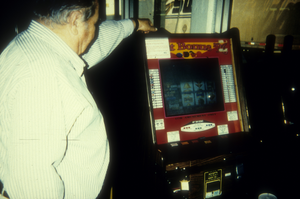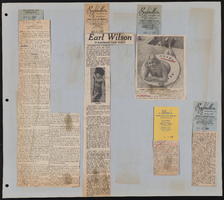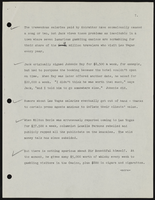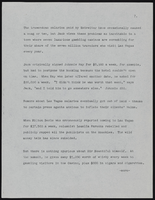Search the Special Collections and Archives Portal
Search Results
Thomas Clark Professional Papers
Identifier
Abstract
The Thomas Clark Professional Papers (1950-1998) contain materials from his tenure as a Professor of English at the University of Nevada, Las Vegas (UNLV), which are divided into two series. The gaming research series includes newspaper clippings, correspondence, brochures, bulletins and articles. Also included are book chapters, a glossary of terms used in the casino industry, and gambling guides. In the linguistics and teaching series there are research files, articles, speeches, correspondence, interviews, multimedia, workshops, and conference materials. Also included are files on graffiti, symbolism, ethnic and regional speech differences, language usage, and National Council of Teachers of English (NCTE) material. Additional materials include colleague publications and cassette tapes of interviews from students in courses Clark taught at UNLV.
Archival Collection

Transcript of interview with Sam Earl by Laura Button, March 9, 1981
Date
Archival Collection
Description
On March 9, 1981, Laura Button interviewed Sam Earl (born 1912 in Virgin, Utah) about his life in Nevada. Also present during the interview is Sam’s wife, Melissa Earl. The three discuss a wide range of topics from the early development of Las Vegas, Sam’s work on the Boulder Dam, the Earls’ early residence in a tent, and the family’s religious participation. The interview also covers gambling, Block 16, the first members of the police force, recreational activities, and the Helldorado parade. Sam also talks about his work as a building contractor, including some of the buildings and casino properties he helped build, and the interview moves to a discussion of the development of the Las Vegas Strip. The interview concludes with Sam’s description of his work as a truck driver and a discussion on welfare benefits.
Text
D. L. Newell oral history interview
Identifier
Abstract
Oral history interview with D. L. Newell conducted by Paula Sue Curry on February 26, 1977 for the Ralph Roske Oral History Project on Early Las Vegas. In this interview, Newell describes life in Henderson, Nevada during the 1950s and how the city has changed. Newell discusses the companies that established chemical and metal plants in Henderson, how the growth of Las Vegas, Nevada affected Henderson, and the history of gambling in Southern Nevada. He also talks about mining, medical care available in Henderson, local celebrations, and pollution caused by chemical and metal plants.
Archival Collection

Transcript of interview with Owen Earl Cox by Mark Milford, March 6, 1981
Date
Archival Collection
Description
On March 6, 1981, Mark Milford interviewed Owen Earl Cox (born 1909 in Bunkerville, Nevada) about his experiences growing up in and working in Nevada. Cox first talks about his early moves to and from Nevada and his work in road construction in the 1930s. He then discusses his work of machinery at the Basic Magnesium Plant and some of his experiences during that time. Cox also talks about his family, the Mormon Church, the growth of population, and the increase in tourism. He later describes managing a store he owned known as Vegas Village and the types and prices of the products that were sold there. The end of the interview involves a discussion of crime, Cox’s hobby of cattle ranching, and his views on the growth of Las Vegas.
Text

Slide of a slot machine in a casino, Texas, circa 1970-1990s
Date
Archival Collection
Description
Image
Cleona Sorenson and Theona Ohlson oral history interview
Identifier
Abstract
Oral history interview with Cleona Sorenson and Theona Ohlson conducted by Fred F. Aldrich on March 04, 1977 for the Ralph Roske Oral History Project on Early Las Vegas. In this interview, Cleona and Theona discuss growing up in Mesquite, Nevada and later moving to Las Vegas, Nevada. The two then describe life during World War II, the increase of tourism in southern Nevada, and the significance gambling has to the growth of the Las Vegas economy.
Archival Collection
Audio recording clip of interview with Rev. Prentiss Walker by Bernard Timberg, January 27, 1974
Date
Archival Collection
Description
Part of an interview with Rev. Prentiss Walker conducted by Bernard Timberg on January 27, 1974. Walker describes discrimination during Hoover Dam construction and life in Las Vegas prior to segregation.
Sound



